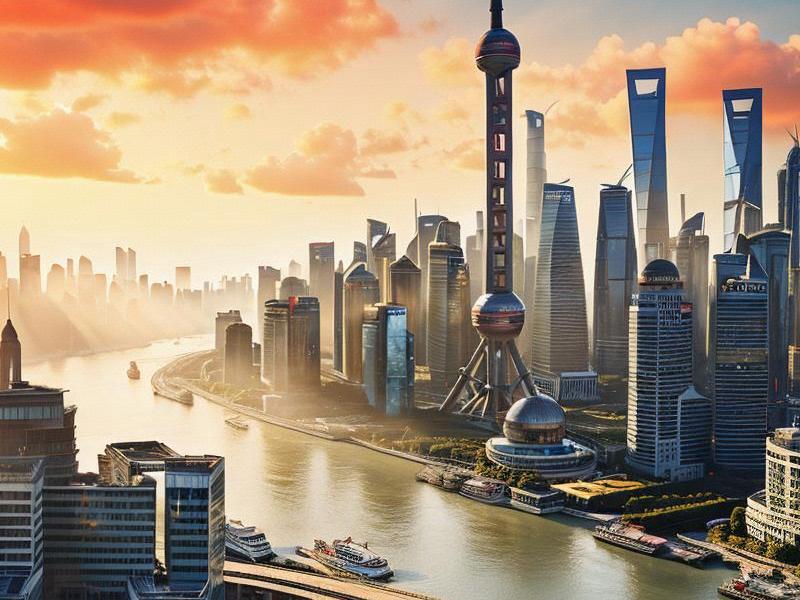This article delves into the multifaceted character of Shanghai, exploring its role as a leading global city in innovation, culture, and economic development. It highlights the city's transformation over the years and its significance on the world stage.

Shanghai, the largest city in China and one of the most dynamic urban centers in the world, has long been a symbol of China's rapid economic development and modernization. Over the past few decades, Shanghai has transformed from a relatively small port city into a global metropolis that is a hub for finance, trade, culture, and innovation.
The city's strategic location on the eastern coast of China, at the mouth of the Yangtze River, has been a key factor in its rise to prominence. Shanghai's port is one of the busiest in the world, handling millions of tons of cargo annually and serving as a gateway for international trade. This maritime advantage has allowed Shanghai to become a major player in global commerce, attracting businesses and investments from around the globe.
Economically, Shanghai is a powerhouse. It is home to the Shanghai Stock Exchange, one of the largest stock exchanges in Asia, and is a leading financial center in China. The city boasts a diverse economy that includes manufacturing, technology, real estate, and services. In recent years, Shanghai has made significant strides in promoting high-tech industries and startups, fostering an environment that encourages innovation and entrepreneurship.
One of the most striking aspects of Shanghai is its urban development. The city is known for its iconic skyline, dominated by the Oriental Pearl Tower, the Jin Mao Tower, and the Shanghai Tower, which is the tallest building in China and the second-tallest in the world. These skyscrapers, along with the historic Bund and the futuristic Pudong district, showcase Shanghai's blend of tradition and modernity.
爱上海同城对对碰交友论坛 Culturally, Shanghai is a melting pot of influences. The city has a rich history that dates back to the 19th century when it was one of the treaty ports opened to foreign trade. This period saw the influx of Western culture, architecture, and cuisine, which have left a lasting impact on the city. Today, Shanghai is known for its vibrant arts scene, with numerous museums, galleries, theaters, and music venues. The city hosts international cultural festivals and events, attracting artists and audiences from around the world.
Education is another area where Shanghai excels. The city is home to some of the top universities in China, including Fudan University and Tongji University, which are renowned for their academic programs and research capabilities. Shanghai's education system is highly regarded, producing a skilled workforce that contributes to the city's economic growth and innovation.
In recent years, Shanghai has also made significant efforts to promote sustainable development and environmental protection. The city has implemented various initiatives to reduce pollution, improve public transportation, and enhance green spaces. The construction of the Hongqiao Transportation Hub, which integrates high-speed rail, metro, and bus services, is a testament to Shanghai's commitment to efficient and sustainable urban planning.
Shanghai's role in China's Belt and Road Initiative further underscores its importance on the global stage. As a key node in this ambitious project, Shanghai is playing a crucial role in connecting China with other parts of Asia, Europe, and Africa through trade and infrastructure development. This initiative is expected to boost Shanghai's international influence and economic prospects even further.
上海龙凤419自荐
The city's government has been proactive in attracting talent and fostering innovation. Initiatives such as the Shanghai Free-Trade Zone have created a favorable business environment for foreign companies and startups. The city also offers various incentives for research and development, encouraging local businesses to invest in cutting-edge technologies and innovation.
Tourism is another significant contributor to Shanghai's economy. The city attracts millions of visitors each year who come to experience its unique blend of history, culture, and modernity. Attractions such as the Yu Garden, the Nanjing Road shopping street, and the Shanghai Museum are popular among tourists. The city's vibrant nightlife, with its bars, clubs, and restaurants, also adds to its appeal.
Despite its rapid development, Shanghai has managed to preserve much of its historical and cultural heritage. The Old City, with its narrow streets and traditional architecture, offers a glimpse into the city's past. The French Concession, with its charming cafes and boutiques, is another area that reflects Shanghai's colonial history.
上海龙凤419 Shanghai's future looks promising as the city continues to evolve and adapt to the changing global landscape. The Chinese government has outlined plans for Shanghai to become a global center for innovation, finance, and culture by 2035. This vision includes further urban development, technological advancements, and cultural exchanges.
However, Shanghai also faces challenges in areas such as housing affordability, traffic congestion, and environmental sustainability. Addressing these issues will be crucial for the city's continued growth and success.
In conclusion, Shanghai stands as a beacon of China's progress and a model for other cities aspiring to achieve similar levels of development. Its unique blend of tradition and modernity, economic prowess, and cultural vibrancy makes it a city that continues to captivate and inspire. As Shanghai looks to the future, its ability to innovate, adapt, and maintain its charm will be key to its enduring success on the world stage.